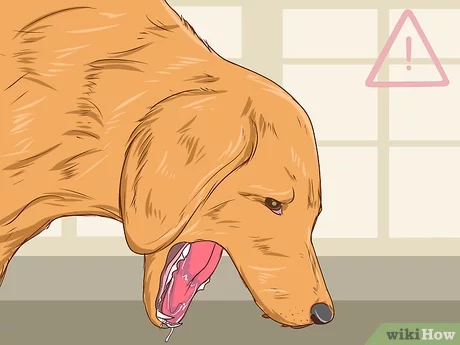Why Does My Dog Lick The Air
Mystery Solved: Why Does Your Dog Lick the Air?
If you’ve ever caught your dog sticking out their tongue and licking the air for no apparent reason, you may have wondered what’s going on inside their furry little head. Is it a form of canine meditation? A weird tic? A sign of some underlying health issue? Or just a quirky behavior that dogs do for fun?
Well, the good news is that you’re not alone in your perplexity. Many dog owners and experts have puzzled over this peculiar phenomenon, which goes by various names such as air licking, lip smacking, or fly biting. And while there’s no single definitive answer that applies to all cases, there are several plausible explanations that can shed some light on why your dog engages in this odd activity.
In this comprehensive guide, we’ll explore some of the most common reasons why dogs lick the air, based on scientific research, veterinary experience, and anecdotal evidence from real dog owners. Along the way, we’ll also address some related questions and concerns that you may have about your dog’s health and behavior.
So buckle up and get ready to learn more about your furry friend than you ever thought possible! We promise to make it entertaining, informative, and maybe even a little bit surprising.
Chapter 1: The Anatomy of Air Licking
Before we delve into the reasons why dogs lick the air, let’s first take a closer look at what exactly happens when they do so. While it may seem like a simple act of sticking out the tongue and moving it around in empty space, there are actually several subtle variations and nuances that can indicate different underlying motivations or sensations.
For example, some dogs may lick the air repeatedly and rapidly, almost like they’re trying to catch invisible flies or mosquitoes. This type of air licking is often associated with neurological disorders or seizures, which we’ll discuss later in more detail.
Other dogs may lick the air more slowly and purposefully, as if they’re savoring a tasty treat or trying to clean their teeth. This type of air licking is more likely to be related to oral health issues or digestive discomfort, which we’ll also cover in later chapters.
Still other dogs may lick the air in a more relaxed and leisurely manner, without any apparent urgency or goal. This type of air licking can be interpreted as a form of self-soothing or stress relief, which we’ll explore in more depth in Chapter 3.
By observing your dog’s specific pattern of air licking, you can begin to narrow down the possible causes and take appropriate action if necessary. Of course, it’s always a good idea to consult with your veterinarian if you have any concerns about your dog’s health or behavior.
Chapter 2: The Science of Air Licking
While dogs have been licking the air for centuries, it’s only in recent years that researchers have started to investigate this behavior in a systematic way. One study published in the journal Frontiers in Veterinary Science examined the prevalence and characteristics of air licking among various dog breeds and ages.
The study found that nearly half of the surveyed dogs engaged in some form of air licking, with younger dogs being more likely to do so than older ones. The most common types of air licking were lip smacking and tongue flicking, followed by fly biting and muzzle rubbing.
Interestingly, the study also found that certain breeds were more prone to air licking than others. For instance, Bulldogs and Boxers were found to have higher rates of fly biting, while Cavalier King Charles Spaniels and West Highland White Terriers were more likely to engage in lip smacking.
While these findings don’t necessarily explain why dogs lick the air, they do suggest that there may be some genetic or breed-related factors involved. It’s possible that certain breeds are predisposed to certain types of air licking due to their anatomy, physiology, or temperament.
Chapter 3: The Emotions of Air Licking
When it comes to understanding why dogs lick the air, it’s important to consider their emotional state as well as their physical sensations. Dogs are social animals who experience a wide range of emotions, from joy and excitement to fear and anxiety.
One common theory about air licking is that it’s a self-soothing behavior that dogs use to cope with stress or discomfort. Just like humans may bite their nails, twirl their hair, or tap their feet when they’re nervous or bored, dogs may lick the air as a way to calm themselves down or distract themselves from unpleasant feelings.
For example, if your dog is feeling anxious about being left alone or hearing loud noises outside, they may start licking the air as a way to release tension and redirect their attention. Similarly, if your dog has an upset stomach or acid reflux, they may lick the air as a way to alleviate the discomfort in their throat or mouth.
Of course, not all air licking is necessarily related to stress or discomfort. Some dogs may simply find the sensation of moving their tongue around in the air pleasurable or stimulating, especially if they’re bored or lacking in mental stimulation.
Chapter 4: The Health of Air Licking
While most cases of air licking are harmless and don’t require any intervention, there are some situations where this behavior can be a sign of underlying health problems. Here are some potential medical issues that may cause dogs to lick the air:
– Oral pain or inflammation: If your dog has dental problems such as gum disease, tooth decay, or oral tumors, they may lick the air as a way to relieve the pain or discomfort in their mouth. Similarly, if your dog has eaten something sharp or toxic that has lodged in their gums or throat, they may lick the air in an attempt to dislodge it.
– Seizures or neurological disorders: If your dog’s air licking is accompanied by other symptoms such as muscle twitching, staring, or loss of consciousness, it may be a sign of a seizure or other neurological disorder. These conditions can be caused by various factors such as brain tumors, epilepsy, or poisoning, and require prompt medical attention.
– Digestive problems: If your dog has an upset stomach, acid reflux, or other digestive issues, they may lick the air as a way to soothe their throat or mouth. Similarly, if your dog has ingested something that is causing irritation or inflammation in their digestive tract, they may lick the air as a way to expel the offending substance.
– Allergies or irritants: If your dog is exposed to allergens such as pollen, dust mites, or mold spores, they may develop respiratory symptoms such as sneezing, coughing, or air licking. Similarly, if your dog comes into contact with irritants such as cleaning products or pesticides, they may lick the air as a way to remove the unpleasant taste or smell from their mouth.
Chapter 5: The Training of Air Licking
If your dog’s air licking is not related to any health issues and doesn’t seem to cause them any distress or harm, you may wonder whether you should try to train them out of this habit. While it’s certainly possible to modify your dog’s behavior through positive reinforcement and redirection techniques, it’s important to consider whether this is necessary or desirable in your particular case.
For example, if your dog only licks the air occasionally and doesn’t interfere with their daily activities or interactions with people and other dogs, you may decide that it’s not worth the effort to try to stop them from doing so. In fact, some dogs may find air licking enjoyable and stimulating in a harmless way that allows them to express their individual quirks and personalities.
On the other hand, if your dog’s air licking is excessive, disruptive, or indicates an underlying health problem, you may want to take steps to address it. This could involve consulting with your veterinarian to rule out any medical issues, providing your dog with more mental and physical stimulation to reduce their stress levels, or teaching them alternative behaviors that are more appropriate and rewarding.
For example, instead of scolding your dog for air licking, you could teach them a command such as “settle” or “relax” that encourages them to lie down and take deep breaths. You could also provide them with interactive toys, puzzle games, or chew toys that engage their senses and keep them entertained. By focusing on positive reinforcement rather than punishment or coercion, you can help your dog feel happier and more secure in their environment.
Chapter 6: The Fun of Air Licking
Now that we’ve covered the serious side of why dogs lick the air, let’s end on a lighter note and explore some fun facts and anecdotes about this quirky behavior. Here are some interesting tidbits that you may not have known about air licking:
– Air licking is not limited to dogs. Many other animals such as cats, horses, cows, and even humans have been observed engaging in similar behaviors. Some researchers speculate that air licking is a universal stress-relieving mechanism that evolved across different species.
– Some dogs may lick the air as a way to communicate with their human companions. For example, if your dog wants attention or affection but doesn’t want to jump on you or bark at you, they may lick the air as a subtle signal that says “I’m here and I love you”.
– Air licking can be contagious among dogs. If one dog starts licking the air in front of another dog, the second dog may imitate the behavior even if they don’t know why they’re doing it. This is known as social learning or observational conditioning.
– Air licking can be a source of amusement and entertainment for dog owners. Many people find it hilarious to watch their dogs stick out their tongues and make funny faces while licking the air. Some even create memes, videos, or social media accounts dedicated to air licking dogs.
So there you have it, folks. We hope that this guide has answered some of your burning questions about why dogs lick the air, and provided you with some insights and laughs along the way. Remember, every dog is unique and deserves to be treated with love, respect, and understanding. If you ever feel unsure about your dog’s behavior or health, don’t hesitate to seek professional advice from a qualified veterinarian or animal behaviorist. And most importantly, enjoy your furry friend’s quirks and idiosyncrasies, because they’re what make them special and unforgettable!



